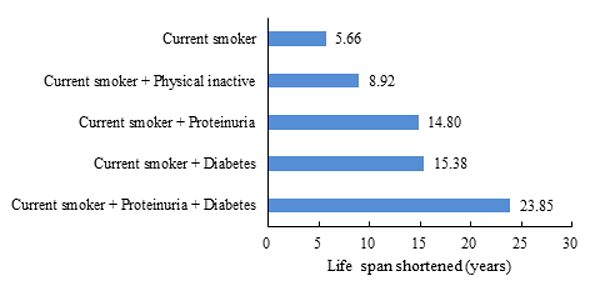Recent manuscripts
Archive
Editorial Board
Aims and Scope
Open Access
Indexing
Contact us
Authorship & COI
Principles of Transparency Checklist
Publication Ethics
Crossmark
Data Policies
Supporting Diversity
Instructions to authors (PDF)
Manuscript Types
Manuscript Formatting
How to submit
Special Publications & Reprints
Preprints
The life-shortening effect of smokers when accompanied by other common risks
1
Texas A&M School of Public Health, United States of America
2
MJ Health Management Institution, Taipei, Taiwan, China
3
National Health Research Institutes, Miaoli, Taiwan, China
4
China Medical University Hospital, Taichung, Taiwan, China
5
Long Beach VAMC Hospital, University of Irvine Medical Center, United States of America
6
John Tung Foundation, Taipei, Taiwan, China
Publication date: 2018-03-01
Tob. Induc. Dis. 2018;16(Suppl 1):A826
KEYWORDS
TOPICS
ABSTRACT
Background:
Smokers usually feel fine and accept the commonly cited risks. However, many smokers are unaware that they carry additional risks that would further shorten their lives.
Methods:
The cohort, 434,496, was recruited from participants in a health surveillance program between 1994 and 2008. Blood and urine were collected and analyzed. Mortality was followed up by matching with National Death file. Hazard ratios (HR) and loss of life expectancy were calculated, based on the reference group of those without the risk factor(s).
Results:
Male smokers as a group had their life expectancy shortened by 5.66 years. When smokers were inactive, life shortened by 8.92 years. When accompanied by proteinuria or diabetes, years of life shortened became 14.8 and 15.4 respectively. When smokers have both proteinuria and diabetes, life years lost became 23.85. Life years lost from 2or 3 risks were found to be additive.

[Years of life lost from multiple risk in male]
Conclusions:
The life-shortening effect of additional risk was surprisingly large, and could be used to motivate them to quit to extend their lives.
Smokers usually feel fine and accept the commonly cited risks. However, many smokers are unaware that they carry additional risks that would further shorten their lives.
Methods:
The cohort, 434,496, was recruited from participants in a health surveillance program between 1994 and 2008. Blood and urine were collected and analyzed. Mortality was followed up by matching with National Death file. Hazard ratios (HR) and loss of life expectancy were calculated, based on the reference group of those without the risk factor(s).
Results:
Male smokers as a group had their life expectancy shortened by 5.66 years. When smokers were inactive, life shortened by 8.92 years. When accompanied by proteinuria or diabetes, years of life shortened became 14.8 and 15.4 respectively. When smokers have both proteinuria and diabetes, life years lost became 23.85. Life years lost from 2or 3 risks were found to be additive.

[Years of life lost from multiple risk in male]
Conclusions:
The life-shortening effect of additional risk was surprisingly large, and could be used to motivate them to quit to extend their lives.
Share
RELATED ARTICLE
We process personal data collected when visiting the website. The function of obtaining information about users and their behavior is carried out by voluntarily entered information in forms and saving cookies in end devices. Data, including cookies, are used to provide services, improve the user experience and to analyze the traffic in accordance with the Privacy policy. Data are also collected and processed by Google Analytics tool (more).
You can change cookies settings in your browser. Restricted use of cookies in the browser configuration may affect some functionalities of the website.
You can change cookies settings in your browser. Restricted use of cookies in the browser configuration may affect some functionalities of the website.

